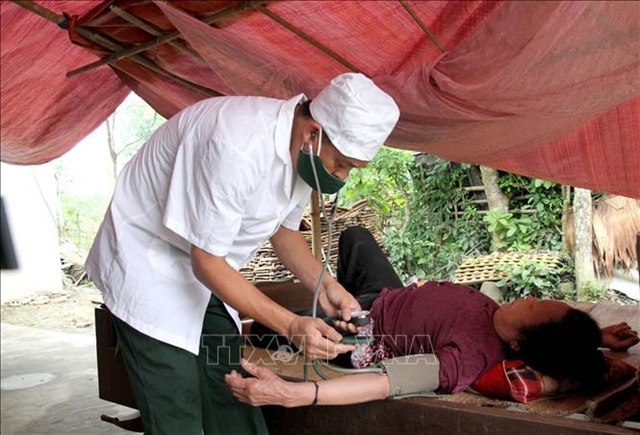
NGHỆ AN — A ‘Border Medicine Cabinet’ model in remote and poor villages along the Nghệ An Province border has made a significant contribution to providing healthcare services for ethnic people in recent years.
The model, launched by the Nghệ An Border Guard, has not only treated hundreds of emergencies but also played a great role in changing awareness and improving people’s health.
For the last three years, ethnic people in border villages Vều 1, 2, 3 and 4 in Phúc Sơn Commune of Anh Sơn District have become familiar with military medical officers at Phúc Sơn Border Guard Station visiting their homes.
At the Vều 2 Border Guard Station, where the border medicine cabinet is held, people can visit and receive free medicine at any time. Whenever it is needed, the military medical staff will arrange a time to visit and give medicine.
In severe cases, the staff will guide them to higher-level medical facilities.
La Thị Chiến, a 75-year-old woman living in Vều 2 Village, is in poor health and all her children died young, so she lives alone.
In previous years, she had to endure the illness whenever she got sick because she had to ask relatives to take her to a medical station far from the village.
“Since the border guard opened the model Border Medicine Cabinet, I no longer had to travel more than 20km to the commune’s clinic for medical examination,” Chiến said.
Nearly 30km from the centre of Năm Cắn Commune of Kỳ Sơn District, although the road is concrete, to enter Huổi Pốc Village village, people have to pass steep passes with many bends that challenge drivers.
The villagers are Mông ethnic people and their awareness of healthcare is still limited. For a long time, when getting sick, they use leaves and roots or were prayed for by shamans as a treatment.
But, since the Border Guard of Nậm Cắn International Border Gate established a permanent working group and built the “Border Medicine Cabinet”, people’s awareness has changed for the better.
Lầu Chống Nhìa, a villager, said: “Before the military medical staff came, the villagers only used leaves or invited a shaman to treat them when they were sick.”
“Because of difficult transport, people were lazy to go to the commune health station for health checks. People went to the health station when their illness became more serious, but most died en route because the station was so far and the road was so poor.
“Since the border guards deployed the border medicine cabinet, people’s awareness has gradually changed, every time they are sick, they come to the military medical staff for examination and medicine is also provided free of charge. So they are very happy.”
According to Captain Đặng Văn Tuyến, a military medical officer at Nậm Cắn International Border Gate Station, ethnic people’s awareness is still low, and they are not familiar with the use of medicine.
When the medical unit was set up and the “Border Medicine Cabinet” was opened, the first task of the military medical staff was to cooperate with the village head to mobilise people to go see doctors when getting sick, Tuyến said.
If someone could not go, she or he just made a phone call and the military medics would come to their home to examine and give medicine to reduce the use of leaves or shamans, said the captain.
“Now people trust and love us. Each month, the unit examines 60-80 people. Along with the medical examination, the team also actively cooperated with local authorities and the village health clinic to disseminate population planning policies and prevention of common diseases,” he said.
“Particularly, during the pandemic, each officer was really a communicator to go to every family to ask people to get vaccinated.”
Currently, Nghệ An Border Guard is maintaining eight border medicine cabinets in which, there are six cabinets deployed at six clinics, and two placed at Phúc Sơn and Nậm Cắn border guard stations.
The most difficult issue is the limited supply of medicines and medical supplies for the cabinets.
Although the units have called for a number of benefactors, businesses, and organisations for support, most of the current medicines are given to military units but have not been used up.
According to Colonel Hồ Hữu Thắng, deputy commander of the Nghệ An Border Guard, since its establishment, the model has provided health examination, first aid, treatment, and medicine distribution to thousands of people.
Together with the local health network, the model has implemented many health programmes such as malaria prevention, vaccination expansion, reproductive healthcare and family, Thắng said.
In the future, along with seeking benefactors, the Border Guard will continue to expand the model in many villages in remote mountainous areas. — – VnExpress News
- Reduce Hair Loss with PURA D’OR Gold Label Shampoo
- Castor Oil Has Made a “Huge” Difference With Hair and Brow Growth
- Excessive hair loss in men: Signs of illness that cannot be subjective
- Dịch Vụ SEO Website ở Los Angeles, CA: đưa trang web doanh nghiệp bạn lên top Google
- Nails Salon Sierra Madre
 VnExpress News The News Gateway of Vietnam
VnExpress News The News Gateway of Vietnam





